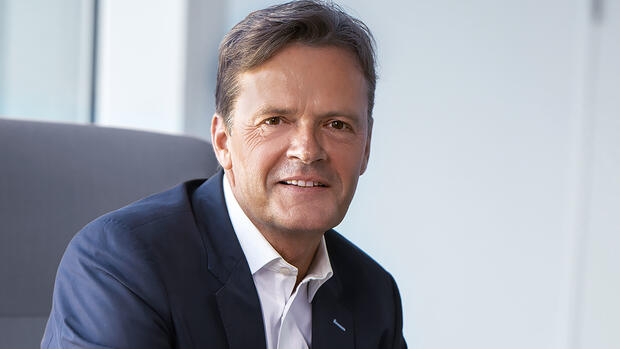Vienna, Dusseldorf Markus Schäfer can hope for a second term as chief developer at Mercedes-Benz. The contract of the qualified engineer, which expires in May 2024, is likely to be extended by two years at the latest in the autumn, the Handelsblatt learned from corporate circles. All in all, Schäfer is doing a good job and should continue to do so, according to those close to the supervisory board. Mercedes declined to comment.
The personality polarizes. The Chief Technology Officer is recognized and quite popular in his own field. In the sales and finance departments, on the other hand, some managers sometimes have an allergic reaction just hearing Schäfer’s name. They accuse him of a lack of innovative power, sluggish electrical sales and escalating costs. There was also a tendency towards arrogance.
For example, Schäfer is said to have recently explained in several rounds that Mercedes is technologically “better” than the American electric car pioneer Tesla. A fit of arrogance, say his critics. Well-meaning people, on the other hand, speak of a correct classification, for example with a view to highly automated driving systems, for which Mercedes, unlike Tesla, is street legal.
Not a serious alternative
Mercedes boss Ola Källenius and chief controller Bernd Pischetsrieder apparently have little doubt about Schäfer. This is also due to the fact that no alternative candidate has come up internally. And even if there should be someone from the outside – he or she would need time to get used to it, according to corporate circles. Time that you just don’t have in the middle of the biggest transformation of the auto industry in more than a hundred years.
Much of the criticism of Schäfer is also “systemic,” says an insider. As head of development, you can never please everyone. The sales and financial apparatus think much more short-term. The cycles in development, on the other hand, are very long. Nobody can expect infallibility here. What also speaks in favor of Schäfer: He is passionate about Mercedes, is considered to be well organized and usually consistently completes the processes that have been initiated.
>> Also read: Mercedes introduces a square steering wheel – and starts with its luxury model
The 58-year-old is a native of the brand with the star. Schäfer joined the company’s junior staff in 1990 and worked his way up over the years. He was a plant manager in Egypt, led the US business and was appointed Division President for Production in 2014.
In this function, he almost silently removed the power of the plant managers and established architecture-based manufacturing networks in order to be able to produce more flexibly. That was well received by the powerful in the group, Schäfer was promoted and has been responsible for development and purchasing at Mercedes since 2019. It is the most important department in the group.
Schäfer loves short distances and flat hierarchies. As Chief Technology Officer, he quickly summoned all the top developers in the extensive research center in Sindelfingen to his open-plan office. A culture shock. Since then, work has been done on demand. There’s enough to do. Schäfer must trim the brand’s model portfolio for luxury.
Adversary goes to Porsche
Small, hardly profitable model series such as the A-Class and B-Class will be discontinued in the future. On the other hand, business with lucrative sub-brands such as AMG and Maybach is being expanded significantly. Schäfer is also responsible for implementing the “Electric only” strategy. By 2030, Mercedes wants to sell only fully electric vehicles if possible. What used to be almost ten architectures are essentially compressed onto three platforms.
Saying goodbye to the combustion engine is difficult for the Swabians. The EQC, the company’s first electric SUV, is a flop. And especially in China, the most important car market in the world, Mercedes has hardly been able to succeed with its other electric cars. The result: pure electric vehicles account for just one tenth of total Mercedes sales. Diesel and petrol engines continue to dominate.
>> Read about this: This is how Mercedes, VW and Co. want to turn their lame e-car business in China
Schäfer must reverse this relationship. Some of the future vehicles have already been developed and should score points with ranges of more than 800 kilometers and outstanding efficiency values. However, controllers fear that margins will collapse, especially for medium-sized vehicles such as the next generation of CLA and GLB. In addition, Mercedes still has to prove whether its own MB.OS software architecture is competitive.
Mercedes initially wanted to develop the operating system, which cost several billion, largely itself. The former software boss Sajjad Khan, who openly opposed Schäfer, was responsible. In the power struggle, Schäfer retained the upper hand. Khan had to go and Mercedes opened up MB.OS more to collaborations with tech giants like Google. If MB.OS is a success, Schäfer’s contract could be extended again beyond 2026.
Meanwhile, his adversary Khan is moving to Porsche in November, as the sports car manufacturer announced on Tuesday during its annual general meeting in Stuttgart. The 49-year-old is to head a new area called Car-IT in Zuffenhausen, so the board will be expanded. The personnel had been expected for a long time, but Mercedes had not released the manager for the rival earlier.
Recently, Porsche was anything but happy with the Cariad software unit, which supplies the entire Volkswagen group. Khan’s homework book should therefore include not only better coordination with Cariad but also Porsche’s own car IT strategy. The Zuffenhausen-based company is increasingly going its own way, recently announcing a cooperation with the Israeli Intel subsidiary Mobileye in the field of automated driving, which was explicitly presented as a Porsche deal.
More: The Chinese electric car manufacturer Denza is booming – but only since the separation from Mercedes
